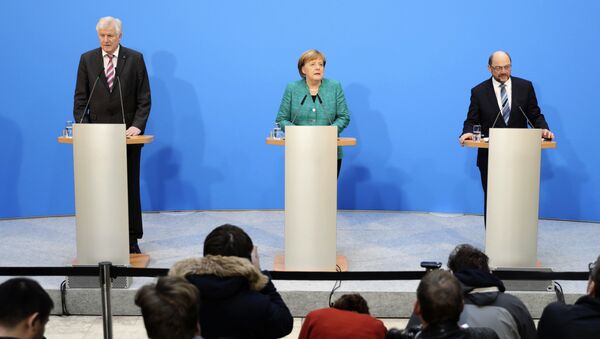Germany's two largest parties, the union of the Christian Democratic Union of Germany and the Christian Social Union in Bavaria and the SPD, each saw the number of their seats in Bundestag go down at the latest parliamentary election in September, following the previous so-called Grand Coalition government, while the AfD, a Bundestag first-timer, became the third largest force in the German parliament with 94 seats out of 709.
"Today's agreement is a disaster for Germany… It is painful to see how ideologically void the Christian Democrats under Merkel have become. This agreement will accelerate the downfall of the Christian and Social Democrats, while it will give a healthy boost to AfD," Meuthen said.
According to the spokesman for the AfD, the new coalition deal was motivated by the party leaders' wish to cling to power rather than by a true vision for Germany.
"It is wise to expect early elections as this sad coalition of power-hungry losers will probably end before 2021," Meuthen added.
The AfD spokesman pointed out that CDU/CSU leader Angela Merkel appeared to lure the SPD in by giving the party some of the more prestigious government positions. SPD head Martin Schulz will become the foreign minister, while Olaf Scholz, the SPD mayor of Hamburg, will head the Finance Ministry.
The coalition government talks focused on several thorny issues, including migration, healthcare and workers' rights. The latest deal still needs to be approved by the SPD members.
READ MORE: 'I Will Fight for EU Renewal as Foreign Minister' — Germany's Schulz
Both the SPD and the CDU/CSU union had ruled out a coalition with the AfD even before the election. The AfD has been particularly criticized for its views on migration, which it wants to minimize.



